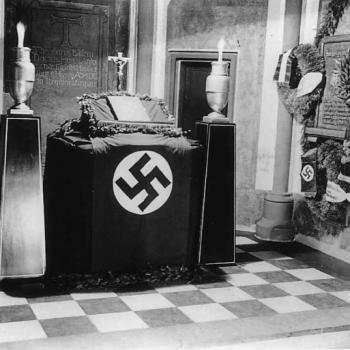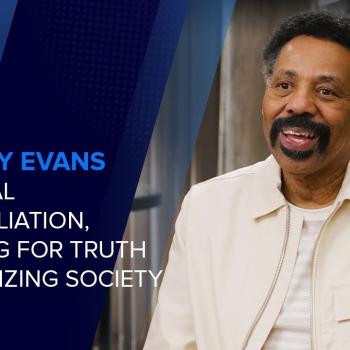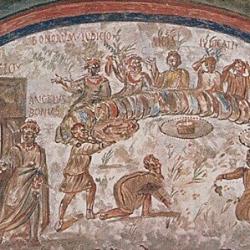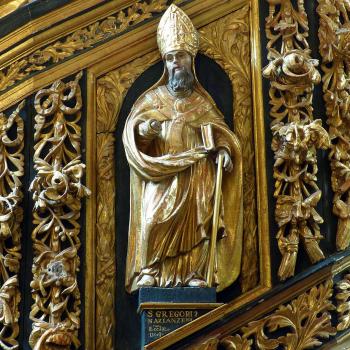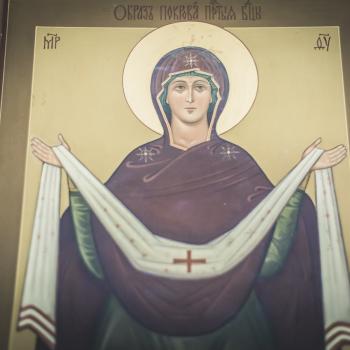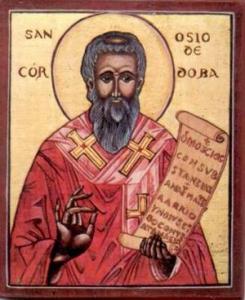
Faith, hope and love go together. Love encourages us to do all kinds of amazing things. It gives us strength and courage. It supports and promotes our faith. Faith without works is dead, and yet, where do those works come from, but out of love? And, with faith, we have reasons to hope, not just for ourselves, but for the good of all. We are, therefore, encouraged by Paul to: “Be watchful, stand firm in your faith, be courageous, be strong. Let all that you do be done in love” (1 Cor. 16:13-14 RSV). This was the attitude of many great confessors and martyrs of the Christian faith. They stood firm in the faith because of their love – their love for God, and through that love, their love for their fellow humanity. We should not romanticize what they went through. When we look to what happened with them, we find, not only did they suffer, but many of their loved ones suffered as well. No one should ever suffer in such a way. What we should recognize is their heroic virtue, the strength and resilience they showed, but we should not do so in such a way which undermines the trials and tribulations of those who were not so heroic, who could not endure – they, too, endured much, and even if they succumbed to pressure, God loves them as well. After all, many who succumbed to pressure were also great saints (like St. Peter).
St. Ossius of Cordova found himself in that situation: as a very old and frail man, he was told to sign an Arian declaration of faith or else his loved ones, as well as himself, would be brutally tortured. The reason why Arian authorities were doing this was that he was the bishop who presided at the council of Nicea and so helped write the Nicene Creed. He had also suffered greatly in his youth as a confessor, and he still had the scars to show what he had previously endured, making his voice an important one for Christians at the time. Thus, while he signed the decree, in order to help his family, if anyone had any doubt as to where he stood, once he knew his family was safe and he was likewise far away from Arian authorities, he renounced the declaration he signed. He acted out of love, even as he was forced to comply against his will. The two, together, allowed many, including St. Athanasius, to not see what he did as being merely a blip which was out of his control, that is, as something which should lead people to think poorly of him. They continued to recognize him for the great legacy he had left behind. He acted out of love and received mercy; others, who likewise find themselves in difficult situations, who find that their conscience tells them to act out of love to help someone even if what is otherwise asked is immoral, can find that so long as it is not what they desire or will, but done out of compulsion, can also receive mercy and love because they acted with such mercy and love. Love can cover a multitude of sins, which is why they can stand firm in and with the God, knowing God will acknowledge and recognize that love instead of cast them aside due to the difficulty love put them in. After all, God did all that God could do for humanity out of love, including taking upon the sin of the world. Indeed, Paul makes it clear that those who do what they can for others should receive recognition for their achievements:
Now, brethren, you know that the household of Stephanas were the first converts in Achaia, and they have devoted themselves to the service of the saints; I urge you to be subject to such men and to every fellow worker and laborer. I rejoice at the coming of Stephanas and Fortunatus and Achaicus, because they have made up for your absence; 1 for they refreshed my spirit as well as yours. Give recognition to such men (1 Cor. 16:15-18 RSV)
Paul rejoiced at the memory of those who came to him to help him, and so too, we should rejoice and look kindly upon those who help us. We should remember them, and cherish them, knowing that we cannot live in this world all alone. We might have the Holy Spirit with us, we might have some extraordinary experiences, like Paul did, but we will still need the support of others. We need companionship. We need people to come to us in love. For, the more love we receive in this fashion, the more we will find our own love can and will be renewed, if not made greater. The greatest example of this is the incarnation. God came to refresh all humanity with love, and continues to do so through the great mysteries of the faith. This is why we should remember God and acknowledge what God does for us in and through them. The eucharist truly should be done in remembrance of Christ, not, of course, because Christ is not present with us in and through the eucharist, but rather, it is because of that presence we can then come to remember all Christ has done and realize all of it is one in him and is being received by us in our reception of the eucharist. He is the one who came to show the world the love God has for it, and despite that, the world knew him not, indeed, the powers that be would not have him, so that, as he presented in a parable, the evil powers that be decided to have him killed:
Hear another parable. There was a householder who planted a vineyard, and set a hedge around it, and dug a wine press in it, and built a tower, and let it out to tenants, and went into another country. When the season of fruit drew near, he sent his servants to the tenants, to get his fruit; and the tenants took his servants and beat one, killed another, and stoned another. Again he sent other servants, more than the first; and they did the same to them. Afterward he sent his son to them, saying, `They will respect my son.’ But when the tenants saw the son, they said to themselves, `This is the heir; come, let us kill him and have his inheritance.’ And they took him and cast him out of the vineyard, and killed him. (Matt. 23:22-39).
There is no greater love than being willing to sacrifice oneself for one’s beloved. God has shown us this in and through the incarnation. But this can also mean that someone like Ossius can sacrifice their honor, their reputation, for the sake of their beloved, and come out on top because such love will be honored and respected. Ossius quickly recanted once what his oppressors held over him was taken away. Thus, like many others who came before him, even St Peter, Ossius might have in some sense denied his faith verbally, but he lived it out in the way of love, and so found ready forgiveness; he is worthy to be remembered and commemorated for all that he had done, for all the time he lived as a confessor, being tortured by non-Christians, for the establishment of the Nicene Creed and its defense, but also as being a man who loved much and was willing to sacrifice himself for his beloved. He, truly, showed he understood what Paul meant when Paul said to do all things out of love.
Stay in touch! Like A Little Bit of Nothing on Facebook.
If you liked what you read, please consider sharing it with your friends and family!
N.B.: While I read comments to moderate them, I rarely respond to them. If I don’t respond to your comment directly, don’t assume I am unthankful for it. I appreciate it. But I want readers to feel free to ask questions, and hopefully, dialogue with each other. I have shared what I wanted to say, though some responses will get a brief reply by me, or, if I find it interesting and something I can engage fully, as the foundation for another post. I have had many posts inspired or improved upon thanks to my readers.





